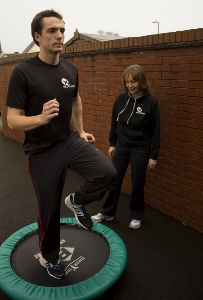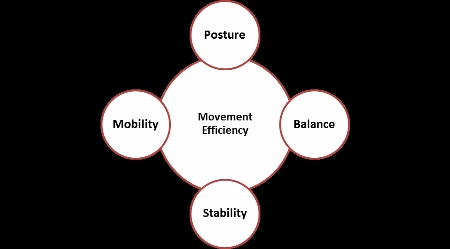Athlete screening: Reduce injury risk and improve performance
What is athlete screening?
 By Sarah Marshall, Chartered Physiotherapist.
By Sarah Marshall, Chartered Physiotherapist.
The screening of an athlete is used to identify the current musculoskeletal condition of that individual. If carried out initially during the pre-season period, it can provide a set of baseline values for the athlete’s database or personal physical profile.
Repeat screenings throughout the season can then identify any physical changes. This is particularly important with a growing and developing skeletal system.
At Excelsior, we use a baseline screening of 5 different exercises that assess the individual’s ability to move in 3 dimensions in a coordinated fashion. We are looking to find out what a person CAN do as opposed to what they CAN’T do.
We look at Posture, Balance, Stability and Mobility and this helps us gauge the movement efficiency of the athlete.

Why do we screen?
A functional screening assessment will identify an individual athlete’s musculoskeletal strengths and weaknesses. From these results, an accurate rehabilitation/conditioning programme can be implemented.
Historically, screening would involve observation of static posture and a normal gait pattern. Non-functional assessment of joint movement, muscle strength and flexibility would be carried out. This might include various single joint assessments in sitting or lying positions.
This is good for identifying individual areas of weakness.
However, sportspeople rarely use single-joint movements in these positions; instead, the body works as one unit. By looking at the overall movement we can see the context in which any problems occur.
Sport Specific Screening?

Prolonged periods at a desk or gaming can lead to shoulder and back problems
Whilst it is important to understand the needs and demands of the sport, we do a screening that is Athlete specific, not sport-specific.
An assumption is often made when designing training programmes that the athlete is able to perform basic movements and then start loading them.
Unfortunately, experience has shown that this is the exception rather than the norm.
Anecdotally less than 10% of the sportspeople we screen have been able to perform the basic movements well.
Sportspeople are a product of their environments and posture is affected by daily living (driving, sitting, lying) or by their sport (racquet sports and throwers being one-sided for example).
Prolonged exposure to poor posture can lead to problems. By improving an individual’s movement patterns first, injury risk will be reduced.
Then we can address the needs of the sport and performance can be enhanced.
Repeat screenings can be especially useful post-injury to help determine an athlete’s return to competition.
If you would like more information on screening for you or your athletes, I am happy to answer your queries: we are based in Willand, near Cullompton & Tiverton.

I would like to do this screening on the level1 course, see what the problem areas are
I would love some screening! Have less sided dysfunction / soft tissue issues stemming from an acl reconstruction.
Thanks,
Tom
Hi Tom,
thanks: just contact Sarah then! Knees are her speciality.
Very interesting, I believe that screening athletes would allow there to be a lot more success in sports.
I completed a screening workshop at university and it was amazing what noticeable factors you could just find with visual analysis e.g. Right shoulder a lot more developed than left in a female tennis player.
Lee
I think that screening an individua has gretaly enhanced performance and is becoming a necessary and vital element within training. Building a strong core/posture is vital and I also agree that focusing on what can be done rather than what cannot is a must.
I think that screening can and perhaps should start from an early age to develop a positive core and posture.
James Evans
I believe that screening is a great idea and would help are more elite athletes at school level to progress futher in their sport. I feel that with the type of student that we teach and coach if they knew why we where doing what we where they would be more foucsed and have a much more focused attitude.
I see screening as one of the most important tasks a S&C coach has. Being able to identify the athletes current muscle-skeletal condition to correctly implement a conditioning program seems to be of utmost importance. With Continued screening throughout the season, a S&C coach can monitor the athletes progress and alter the program as and when weaknesses are identified.
I really like the structure of the 5 parts of an athlete which we need to identify. I am a tennis coach and have never normally screened a player before, but it has definitely got me thinking about ways I can screen them to then really help them progress on the tennis court. Also being able to make it relevant for that specific player.
I believe that screening plays an absolutely vital role in an athletes progression and development. Screening to me is very important to S&C as a whole, as these factors have a huge role on the functional efficiency/movement of an athlete. If all deficiencies are picked up asap then an athletes programming can be tailored to improving the deficiencies whilst also improving their overall performance.
I feel screening is one of the most important parts of becoming a better athlete, because the only way to improve is to know and train weakness. I like how it talks about posture as I believe that posture is a major part of haven’t good technique. I also like how the baseline of the 5 different parts that an athlete needs to identify.
Having now experienced a level of screening I see the benefits and rewards of using this process to clearly identify the areas that need to worked on and the basic exercises to help this development, it is specifically important with young players when form over function can lead to serious injuries later in their development.
I can really see the benefits of all athletes performing a screening. Making sure this process is taught to aspiring athletes is beneficial to make them aware of the effects screening has in relation to S&C
I can see the benefits of performing a screening test not just for the coach but also for the athlete so they can physically see where they need to improve and also see progression as training goes along.
Athlete screening looks a very important aspect of pre-training providing the coach with a great insight into performer capabilities.
I can really see the benefits of this, very interesting read. Great motivation for the performer at school level too.
Athlete screening is important so the programme can be tailored correctly to stop throwers having such dominant sides and to correct postural imbalances that wouldn’t necessarily be picked up without this process
Screening is a great way for the coach feel he/she is fully aware of the athlete’s physical condition prior to any session
An interesting read, particularly with regard to complex movements, as opposed to single-joint movements.
Interesting read on posture